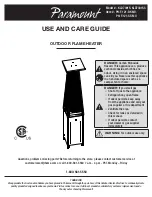
14
Maintenance, Care & Cleaning
To enjoy years of outstanding performance from your heater, make sure you perform the following maintenance activities on a regular
basis:
Keep exterior surfaces clean.
1. Use soapy water for cleaning. Never use flammable or corrosive cleaning agents.
2. While cleaning your unit, be sure to keep the area around the burner and control compartment dry at all times. Do not submerge the
control valve assembly. If the gas control is submerged in water, do NOT use it. It must be replaced.
3. Air flow must be unobstructed. Keep controls, burner, and circulating air passageways clean. Signs of possible blockage include:
□
Gas odor with extreme yellow tipping of flame.
□
Heater does NOT reach the desired temperature.
□
Heater glow is excessively uneven.
□
Heater makes popping noise.
□
Spiders and insects can nest in burner or orifices. This dangerous condition can damage heater and render it unsafe for use. Clean
burner holes by using a heavy-duty pipe cleaner. Compressed air may help clear away smaller particles.
□
Carbon deposits may create a fire hazard. Clean dome and burner screen with warm soapy water if any carbon deposits develop.
In a salt-air environment (such as near an ocean),
corrosion occurs more quickly than normal. Frequently
check for corroded areas and repair them promptly.
STORAGE:
Between uses:
□
Turn the control knob OFF.
□
Disconnect the LP source.
□
Store the heater upright in an area sheltered from direct contact with inclement weather (such as rain, sleet, hail, snow, dust and
debris).
□
If desired, cover the heater to protect the exterior surfaces and to help prevent build-up in air passages. Wait until the heater is cool
before covering.
□
Never leave the LP cylinder exposed to direct sunlight or excessive heat.
SERVICE:
Only a qualified service person should repair gas passages and associated components.
CAUTION:
Always allow heater to cool before
attempting service.



































